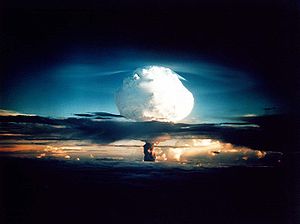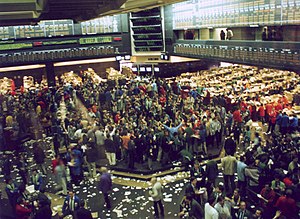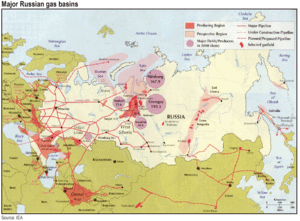| Barbecue fire (Photo credit: Julio Martinez) |
Yikes - That's what I felt like after my recent post
Energy co. wants me to use less - really ? !
Anyone would think I just stood on a nerve, pressed the right buttons, or dialled in a thermonuclear strike !
Some people thought my views absurd, but others agreed strongly.
| Nuclear weapon test Mike (yield 10.4 Mt) on Enewetak Atoll. The first hydrogen bomb ever tested, an experimental device not appropriate for use as a weapon. (Photo credit: Wikipedia) |
As ever the truth lies somewhere between what you think you know and what others misguidedly believe !
The more visceral reactions I were mainly on LinkedIn - this correlates well to the fact that the American Utility industry is not what you might describe as a "mature free market".
(BTW why don't people comment ON the blog itself where everyone can see - it's like putting on a concert on the dark side of the moon ? )
| The Dark Side of the Moon (Photo credit: Wikipedia) |
In much of Europe you can choose your utility provider and mature commodity markets exist, whereas in the US there is very little utility competition - you buy from the local provider or you do without.
The idea that the US is a land of free markets is frankly naive when you look at electricity, gas, (even heat) , telecomms, waste disposal and indeed the essentials for life - water.
I have recently been invited to comment by http://www.pikeresearch.com on a related subject, regarding how limits to control technology expertise cause utilities to struggle with client services.
While it would not be appropriate to share what I have heard regarding their commercial research plans, I did write a response that I am free to share. And it is worth noticing that they very much observe these trends by utility companies but acknowledge that are largely "invisible" as yet in the US.
So, in full knowledge that I probably pouring fuel on a fire that is already lit - here we are...
With a few notes for clarity as {edit}
>>
Dear (anonymous) at Pike Research
It seems you have dropped in on one of my absolute pet subjects for a good rant ! :)
Let me outline my first thoughts below - if these sound interesting I would love my thoughts to be considered (especially because any exposure is direct to utilities who are for us a key route to market).
Let me also offer the caveat that my exposure is mainly to European markets (which vary from totally deregulated to the local monopoly model that is more common in the US).
So the context - Utilities like control system providers all sell largely unbranded commodities.
| The floor of the Chicago Board of Trade, a major commodities exchange in the United States. (Photo credit: Wikipedia) |
{NOTE - this is where a competitive market is assumed - Your Mileage May Vary !}
Explanation - a kWH gas or electricity is better if cheaper - A thermostat is not "better" if it says Honeywell, Siemens or Johnsons on the casing 0 - it either does its job or not - cheaper is better.
Even facility managers when contracts are replaced for big buildings will leave the staff in situ to the new incumbent. They sell numbers of people (security guards / cleaners - not "People").
{BTW this is mindless compliance to tender processes rather than "best practice" - much of the public tendering eg under OJEC / OJEU is at best a complete whitewashing façade to pay lip-service to competitive tenders - If the same people end up doing the job regardless of who wins the tender what is the point ? - This introduces bureaucratic middlemen and solves nothing from a corruption perspective}
Awareness of the actions of these commodities {what the people actually do} is 100% obscured at the point of sale:
| US Cotton candy - English Candy Floss (Photo credit: Wikipedia) |
At the meter energy is sold,
- the utility does not know if it is used to blow leaves or make cotton candy.
At the wholesaler control systems are distributed,
- the manufacturer has no idea if the relay will switch on a compressor, a fountain or a furnace.
The FM provider has no idea where the restrooms are in the building
- this is for the cleaning staff to know.
This is possible because each provides "non-core" services to its client. Hotels use all three of these "commodities", as do prisons, and schools, offices, Starbucks or Mom and Pop stores and glass blowing factories.
So the true commodity supplier has no concept of the business model or operation of his client - it does not serve to know this
{ KEY POINT OF BLOG POST - HOW TO HANDLE THE SHIFT IN FOCUS }
However, look at the energy data and in the patterns these can reliably be recognised (Bakers burn gas at weird times of day in summer and winter, schools have holidays and offices have open hours).
So given pattern recognition "meta-data" about the demand side exists. Demand side management from a utility perspective is about re-scheduling rather than avoidance and relies on pricing motivation, rather than pragmatism. This is why there are numerous companies selling "more efficient XYZ or consultancy services "guaranteed to save".
Now consider this...
{The bizarre case of non-competitive communism promoting capitalism}
Unlimited heating was considered {theoretically - just as much as food} a human right in the old Soviet Union (and in Moscow gas still costs a few dollars for as much as you can use) - So there is NO motive to save energy (at first sight).
However, Gas not sold to Moscovites can be sold to the Ukraine, Germany, Switzerland, Italy and France AND it is. So if you can get someone to use less for the same service fee (and be as happy), you have more to sell to someone else.
| Major Russian gas basins (Photo credit: Wikipedia) |
The implication is that where supply-side demand management co-operation and interchangeability exists (as is planned for the US but is a bit vulnerable) a preference for efficient clients exists (you can make more money from them - because they will pay more for less of the commodity if you provide attractive services that help their efficiency ).
{How third-world are gray-outs ?
- Not very it seems!},
These added value services differentiate and are more profitable, assist client retention and reduce client acquisition cost.
The implication is that Utility companies want to save clients energy (or increasingly will do so) but wish to be paid to do so (otherwise they face a price race to the bottom of the market).
| Protests against shale gas drilling in Bulgaria (Photo credit: Wikipedia) |
However even more interesting is that this need to control energy use better is one that even the big controls companies cannot manage, because they focus on hardware and not on selling relationships.
The key must be to gain insight regarding purpose - WHY energy is used. This can be seen through correlation to time of day and week and weather conditions, but not by studying the control systems because implicit in adoption of the control system as an efficiency yardstick is the assumption that control is as necessary rather than merely sufficient to achieve past political objectives (like those boilers in Moscow ) "!
Utilities will achieve effective demand side management not through the introduction of gadgetry, but by understanding how why and what their clients use energy {for}. - This is not their current focus - bar some more progressive exceptions.
>>
Conclusion
So - as markets mature (and competition takes place) commodity markets force profitability out of client bases. The inevitable response options to free-market demands of the utility provider are:
- To maintain monopoly power at any cost
- To develop anti-trust cartel practices (I make no accusations here - but others do)
- To explore market differentiation and segmentation (fight the commodity labelling)
- To diversify (funding capital projects etc)
- To add service layers.
Now if you are a Utility and you still don't "get" this - look over your shoulder - you are a little bitty bit-player fish in the biggest global marketplace - You WILL be swallowed !
James
PS - If on the other hand you do "get" this - drop us a line - we can help !








